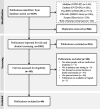Access to preventive health assessments for people with intellectual disability: a systematic scoping review informed by the Levesque Access Framework
- PMID: 40598429
- PMCID: PMC12218937
- DOI: 10.1186/s12913-025-13060-6
Access to preventive health assessments for people with intellectual disability: a systematic scoping review informed by the Levesque Access Framework
Abstract
Introduction: Access to preventive care is essential for addressing the stark health inequities between people with intellectual disability and the general population. Despite evidence that structured annual preventive health assessments in primary care can support the delivery of evidence-based care to people with intellectual disability, their uptake remains low. This scoping review synthesises the literature examining the multiple dimensions of access to health assessments to identify the supply- and demand-side factors that are impacting on people with intellectual disability's access to them.
Methods: This scoping review followed JBI methodology. We systematically searched six databases on 15 February 2024 for relevant peer-reviewed empirical research. Two independent reviewers completed full-text screening and extracted data, mapping it to Levesque and colleagues' theoretical framework of access, which incorporates supply-side features of health systems and services, and demand-side characteristics of consumers and populations.
Results: Of the 1639 identified publications, 40 met the inclusion criteria, all originating from six high-income countries. Most of the published research focused on supply-side factors, such as the availability and promotion of assessments by health services, practitioners' views on their effectiveness; communication challenges; and the provision of reasonable adjustments. Less frequently included were demand-side factors such as communication challenges between the practitioners and the person with intellectual disability, the health literacy both of people with intellectual disability and their carers/supporters, and the level of involvement in, and engagement with, the process by carers/supporters.
Conclusion: This review systematically assesses the supply and demand-side factors impacting on access to health assessments for people with intellectual disability. Supply-side factors are well-documented, and findings on these factors show some consistency across multiple reviews, including this one. There is a need for further research to explore the perspective of practitioners who do not currently offer health assessments. Demand-side factors remain less explored than supply-side factors and warrant further investigation and research is needed to understand the perspectives of people with disability who do not currently access health assessments.
Keywords: Health assessments; Intellectual disability; Preventive care; Primary care.
© 2025. The Author(s).
Conflict of interest statement
Declarations. Ethics approval and consent to participate: No ethics approval was required and consent to participate is not applicable. Consent for publication: Not applicable. Competing interests: The University of Queensland owns the Adult Comprehensive Health Assessment Program (CHAP), a preventive health assessment for people with intellectual disability. The university receives licensing fees from organisations using this health assessment. One third of these fees are paid to Nicholas Lennox.
Figures
Similar articles
-
Home treatment for mental health problems: a systematic review.Health Technol Assess. 2001;5(15):1-139. doi: 10.3310/hta5150. Health Technol Assess. 2001. PMID: 11532236
-
How lived experiences of illness trajectories, burdens of treatment, and social inequalities shape service user and caregiver participation in health and social care: a theory-informed qualitative evidence synthesis.Health Soc Care Deliv Res. 2025 Jun;13(24):1-120. doi: 10.3310/HGTQ8159. Health Soc Care Deliv Res. 2025. PMID: 40548558
-
Education support services for improving school engagement and academic performance of children and adolescents with a chronic health condition.Cochrane Database Syst Rev. 2023 Feb 8;2(2):CD011538. doi: 10.1002/14651858.CD011538.pub2. Cochrane Database Syst Rev. 2023. PMID: 36752365 Free PMC article.
-
Signs and symptoms to determine if a patient presenting in primary care or hospital outpatient settings has COVID-19.Cochrane Database Syst Rev. 2022 May 20;5(5):CD013665. doi: 10.1002/14651858.CD013665.pub3. Cochrane Database Syst Rev. 2022. PMID: 35593186 Free PMC article.
-
The use of Open Dialogue in Trauma Informed Care services for mental health consumers and their family networks: A scoping review.J Psychiatr Ment Health Nurs. 2024 Aug;31(4):681-698. doi: 10.1111/jpm.13023. Epub 2024 Jan 17. J Psychiatr Ment Health Nurs. 2024. PMID: 38230967
References
-
- Iffland M, Jorgensen M, Gillies D. Contributing causes of mortality and potentially avoidable deaths of people with intellectual or learning disability: a data-linkage study. Br J Learn Disabil. 2023;52:456. 10.1111/bld.12569.
-
- Weise JC, Srasuebkul P, Trollor JN. Potentially preventable hospitalisations of people with intellectual disability in New South Wales. Med J Aust. 2021;215:31–6. 10.5694/mja2.51088. - PubMed
-
- Centers for Disease Control and Prevention: Human Development and Disability. Health equity for people with disabilities. 2024. https://www.cdc.gov/ncbddd/humandevelopment/health-equity.html. Accessed 6 Feb 2025.
Publication types
MeSH terms
Grants and funding
LinkOut - more resources
Full Text Sources
Medical
Miscellaneous



